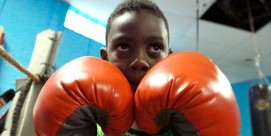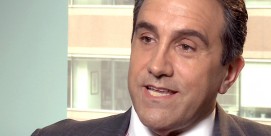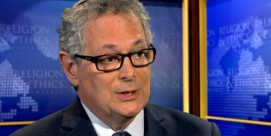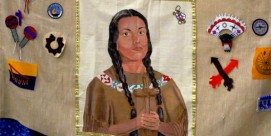Baltimore Students Learn Lessons of the Shoah
by Matt Boivin
Holocaust survivor Rachel Bodner says the Nazis would never have succeeded in killing so many Jews in Belgium during World War II—the United States Holocaust Memorial Museum estimates the number at between 24,000 and 30,000—if only Jews and Christians had talked to one another.
“Why don’t people open their mouths? People didn’t and look what happened—the Holocaust,” says the 83-year-old Belgian Jew. Silence, she explains, was caused by ignorance, and silence and ignorance together led to oppression. Fear of confrontation also played a role.
Bodner, who hid from the Nazis in a Catholic convent and immigrated to the United States in 1947, had an older sister who perished at Auschwitz. This month she spoke about her experiences to Jewish and Catholic students in Baltimore as part of an annual interfaith program of study, dialogue, and commemoration called “Lessons of the Shoah,” the Hebrew word for “catastrophe” used by Jews to refer to the Holocaust.

Led by Jeanette Parmigiani of the Baltimore Jewish Council and Deborah Cardin of the Jewish Museum of Maryland, which cosponsors the program, the purpose of “Lessons of the Shoah” is to help high school students develop respect for and understanding of each other’s faith.
Participants also focus on contemporary genocide, and a survivor of intergroup violence and ethnic hostility in eastern Congo spoke along with Bodner. In addition, students are required to work as a team on a social justice project they choose.
Some religious leaders have observed that interreligious dialogue is losing momentum among new generations of Christians and Jews and that remembering the Holocaust is not as compelling to young American Jews as it was to their elders. But young people are still willing to engage in interfaith dialogue if only given the opportunity, according to Donny Kirsch, coordinator of educational outreach for the Jewish Community Relations Council in Washington, DC who works with “Lessons of the Shoah.”
Kirsch also contacts Jewish congregations to locate Holocaust survivors still willing and able to talk about their experiences. As their numbers dwindle and advancing age makes it difficult for them to travel, Kirsch says it is increasingly important to create local opportunities like the interfaith program in Baltimore for survivors to share their stories.
Among the scholars and religious leaders who participate in “Lessons of the Shoah” are Rabbi Geoffrey Basik, founding rabbi of Kol HaLev (“Voice of the Heart”), a Reconstructionist synagogue community in Baltimore, and Father Robert Albright, a retired Catholic priest in the Archdiocese of Baltimore and former university chaplain who speaks to students on the history of Judaism and Christianity and who listened to Rachel Bodner’s testimony about silence and speaking out.
“If we as kids had a program like they have now,” he said, “this world would be a different place.”
Matt Boivin is an intern at Religion & Ethics NewsWeekly and a student at Spring Arbor University in Michigan.







